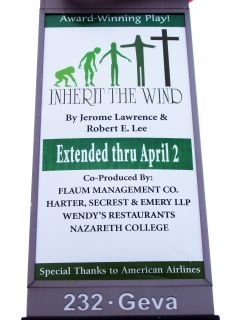(
part I is below)
There have been many significant posts written on this controversy, including
one by Catez Stevens that links to Barbara Curtis’
posting of an exhaustive
article by Randy Alcorn. Alcorn describes his discussions with Mart Green and Steve Saint, whom he contacted as a result of Jason Janz’
post and mass emails that discussed the circumstances of Chad Allen’s hiring. Alcorn was disturbed by Janz’ dissemination of false information. Janz, however, has fully
apologized for not verifying his information before publishing it. Unfortunately, his posts seemed to act as a springboard for slander, undue speculation, and insinuation, without repentance.
These things, as well as other judgmental and unkind speech against Every Tribe Entertainment and Steve Saint, are clearly sin. Whether criticisms are fair or not, Scripture is clear that correction and exhortation be done in love (I Corinthians 13). Even if Allen, Saint, and Green erred in their decisions (and I believe that Allen certainly has with his sexual practice and view that Christianity encompasses it), they stand before God, the ultimate Judge of their actions, as do we all. It is unkind and unfair to assume that the makers of EOTS were rationalizing, or capitulating, or any such thing, without clear evidence. Only God knows their hearts. It’s not necessarily unkind nor unfair to
suspect a problem, but suspicion ought to stay silent unless evidence
proves it.
Nine years ago when Mart Green first learned about the story (after hearing Steve Saint and Mincaye speak), he was deeply inspired to make a film of it. The reason Mincaye and the Waodani agreed to be involved was so they could be missionaries of a sort to Americans! They hoped that Americans might learn that there is a better way than retribution and revenge.
I cannot imagine that ETE would’ve knowingly and purposely betrayed Mincaye and the Waodani, who had put their trust in them. It would’ve been unthinkable to take advantage of them in this way, and I really can’t imagine that Chad Allen, or the building of
false bridges, or anything else would’ve been more important. Unless there’s something really scandalous that we don’t know about the producers of the film, and they had a gay agenda going along with their agenda to publicize the story of the Waodanis. In which case they are outright lying.
The thing is, life is messy. It doesn’t unfold neatly and cleanly with all the pieces seemingly falling into place as we might like it to. If we try to keep it neat and clean, we end up serving a false god, and yes, I’m guilty of this too. If we get mad at others or judge them to be dirtying up our nice, clean Christianity or our nice, clean Christian “stuff,” then the problem lies as much with us as with them. The controversy comes down to this: do we really know enough to be able to judge the motives and actions of the makers of EOTS? And if we have suspicions, are we justified in voicing them without sufficient evidence?
When all is said and done, what is the most important criterion for the movie? That only supposedly good Christians are hired? Or that the story be told in as true a way as possible? If a gay man can portray Nate Saint better than anyone else they found (and maybe others know more about whether they could or not; I admittedly don’t), why should he not do so just because he’s gay, or a gay activist, even?
Does using Allen compromise the telling of the story? Does it dilute the message of the film? If so, how? He played the part well; his homosexuality was not apparent from the way he played the role. If his being in the movie dilutes the Christian message at all, it only does so in the minds of those who make that judgment. The so-called public-relations nightmare is not necessarily the fault of the producers. Even if they did not disclose the truth about Allen in the manner they should have (and who is to determine that?), why must this influence the reception of the movie?
Does the fact that Allen was allowed to be in the movie condone his sexuality in any way? If so, how? The movie’s producers haven’t condoned it; they’ve stated that they allowed him to stay on
in spite of his homosexuality. I think that’s a pretty powerful statement. They gave him a chance. Does the film act as a springboard for Allen or allow him a platform? In other words, might he use his notoriety from the film to advance his agenda? Again, I’m not sure how this would happen. Those who are sympathetic to his agenda probably aren’t terribly receptive to the “Christian” message of the story. Some may see the film
because Allen is in it, and be affected toward the gospel.
Is the message of the film really as unclear as many say? Was the purpose of the film to preach the gospel, and
should it have been to preach the gospel? Jason Janz
thinks so. I don’t agree with him, though. The film is not seeker-sensitive in the sense of compromising or watering-down its message or becoming like the world in order to reach the world; the producers have stated that they wanted to
tell the story as well as they could, and, since the gospel is the heart of the story, the gospel is the ultimate message. No, there is no specific statement in the movie that Jesus died for our sins, but does there need to be? Would the film have been a better evangelical tool had those words been in it? I don’t think the answer is necessarily “yes.”
I do think the movie would’ve been better served by having more explanation of certain elements, including some of the Waodoni activity and the missionaries’ behavior. Would this have made a difference in the way the overall message came across? It’s possible, but I think the main points were still pretty clear. The Waodani learned that there was
a better way. The movie shows that there is a better way than retribution and revenge. Who demonstrated this? The missionaries. Why did they do so? Because they
loved the Waodani. They loved the Waodani because of the love of God through Jesus, Who
"was speared (on the cross) but didn’t spear back". This was a revolutionary concept to the Waodani, yet it was something
relevant to their lifestyle, something they could understand and relate to. Mincaye himself fought it for quite some time but eventually came around, praise God.
The thing is, we can’t expect people who have no means for grasping it to hear “Jesus died for your sins; repent and believe” and just say, “Oh, OK.” Paul says in I Corinthians 9:18-23 “What then is my reward? That, when I preach the gospel, I may offer the gospel without
without charge, so as not to make full use of my right in the gospel.” He is speaking of money, but I think that “right in the gospel” has broader application. He speaks of preaching the gospel in such a way as to have
nothing to boast of, except for the gospel itself. He goes on, “For though I am
free from all men, I have made myself a slave to all, that I might win the more.” This is so important!!! “And to the Jews I because as a Jew, that I might win Jews; to those who are under the Law, as under the Law, though not being myself under the Law, that I might win those who are under the Law; to those who are without law, as without law,
though
not being without the law of God but under the law of Christ, that I might win those who are without law. To the weak I became weak, that I might win the weak; I have become all things to all me, that I may
by all means save some. And I do all things for the sake of the gospel, that I may become a fellow partaker of it.”
I don’t pretend to be a preacher, but my understanding of what Paul is saying is that he
”speaks the language” of whomever he is speaking to in order to be understood, while not compromising his
own behavior and speech in any way. I see the purpose of
End of the Spear as being similar. The “hook” is the common language of story. The invitation is to receive the message of forgiveness as Mincaye and the Waodani did.
It’s been said that those who defend the movie and the producers’ decision do so because of their emotional attachment to the story, which may be true to an extent. But this doesn’t mean it’s not possible for someone to support those decisions for reasons of attachment to truth and Scripture. I also think it’s equally possible that those who feel the producers erred may themselves do so because of an emotional attachment to the story, or to a shining ideal of truth rather than real truth.
To wrap this up – I highly recommend the documentary,
Beyond the Gates of Splendor, which was also produced by ETE and precedes
End of the Spear. The documentary sheds much light on the movie and contains extensive footage and moving testimony of the Waodani, the five missionaries, and their families. There are bits of it in EOTS.
I want to close by listing what I believe are things that make
End of the Spear succeed:
1) It seeks to tell the story of Nate Saint and his co-missionaries as well as possible, and this intent is clear, as are the main points. All of the elements were very carefully planned toward this end.
2) If one pays attention to the subtitles, one can see unmistakable reference to God, Christ, and the Word of God. Through these, non-believing viewers are gently invited to explore further on their own. I can say that it was this kind of “evangelism” that drew
me to
real Christianity; I can’t imagine I’m the only one like this.
3) The forgiveness at the end is clear: Steve Saint (the character) says, “My father didn’t lose his life; he gave it.” He refuses to spear Mincayani in revenge. Why would a man do this for another? For a cause outside of himself. In war, men (and women) do this for their country. In the film, the missionaries did it for God. I’m sorry, but I think that in itself is pretty powerful, something capable of moving someone to look into the matter further.
Most people don’t come to Christ just like that (*snap of fingers*). Not many have a Damascus road experience, but if they do, that’s just the beginning. How many Christians, or those who have been Christians for as long as they can remember, have achieved Christian maturity just like that (*snap of fingers*)? It’s a
process! Is it impossible that
End of the Spear would be one of the early steps in someone’s process, or even be an edifying “step” in a Christian’s process? I know that in seeing this film I was powerfully reminded of the reality and power of God’s love.
4) The adoring relationship Steve Saint had with his father is portrayed well. This is a very important element; had he not loved his father so, it would not have been such a powerful thing for him to forgive his father’s killer.
5) It’s clear that the missionaries were serious about what they were doing; why else would young American couples with babies and very young children go to the jungle wilds where murderous savages lived?
6) It is clear that Rachel Saint and Elisabeth Elliot went to live with the Waodani (after the spearings of the missionaries) in forgiveness; there’s no other way they would have done so.
7) The action and pacing were great. Even my young children (yes!) were engaged by it.
8) Strong feelings were well-played; there was no lack of them and they worked to make the story believable as well as moving.
9) The humanity portrayed in both the Waodani and the missionaries was very poignant and there were many examples, such as the dashed optimism of the missionaries and a young Steve running after his father’s plane as it left, never to return. The beauty of the yellow plane soaring over the lush jungle with blue sky overhead, juxtaposed with the brutal lifestyle of the Waodani and the spearings of the missionaries, was very effective. Waodani women and children ran in panic, hiding from those who would spear them. Scenes of Waodani children laughing and playing and of tribesmen joking showed how human the Waodani were despite the violence of their lifestyle.
10) The clip at the end of movie from
Beyond the Gates of Splendor is wonderful; it shows how Steve Saint’s and Mincaye’s relationship has continued (and is pretty humorous as well). It piques one’s interest to seek out the documentary and watch it (at least, it did me!)






























